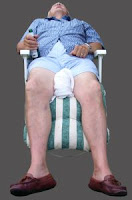Bye-bye Hangover
 What is a "hangover"? Well, it turns out, there is more to this than just being pissed drunk and crazy after a long night of drinking. If you wanna learn what it is, then read along...
What is a "hangover"? Well, it turns out, there is more to this than just being pissed drunk and crazy after a long night of drinking. If you wanna learn what it is, then read along...A hangover, which is also known as veisalgia, describes the sum of unpleasant physiological effects following heavy consumption of drugs, particularly alcoholic beverages. The most commonly reported characteristics of a hangover include headache, nausea, sensitivity to light and noise, lethargy, dysphoria and thirst. The real cause of this anatomical phenomenon is actually still disputed but some theories include hypoglycemia, dehydration, acetaldehyde intoxication, and vitamin B12 deficiency. Hangovers may last up to two or three days after alcohol was last consumed.
An alcohol hangover is associated with a variety of symptoms that may include dehydration, fatigue, headache, nausea, vomiting, diarrhea, weakness, elevated body temperature, hypersalivation, difficulty concentrating, anxiety, irritability, sensitivity to light and noise, erratic motor functions, trouble sleeping, lack of depth perception and/or hair loss. Many people will also be repulsed by the thought or taste of alcohol during a hangover. The symptoms vary from person to person, and occasion to occasion, usually beginning several hours after drinking. It is not clear whether hangovers affect cognitive abilities.

Hangovers are multi-causal. Ethanol has a dehydrating effect by causing increased urine production (such substances are known as diuretics), which causes headaches, dry mouth, and lethargy. Dehydration causes the brain to shrink away from the skull slightly. This can be mitigated by drinking water or an oral electrolyte solution after consumption of alcohol. Alcohol's effect on the stomach lining can account for nausea. Because of the increased NADH production during metabolism of ethanol by the enzymes alcohol dehydrogenase and aldehyde dehydrogenase, excess NADH can build up and slow down gluconeogenesis in the liver, thus causing hypoglycemia.
Another factor contributing to a hangover are the products from the breakdown of ethanol via liver enzymes. Ethanol is converted to acetaldehyde by the enzyme alcohol dehydrogenase, and then from acetaldehyde to acetic acid by the enzyme acetaldehyde dehydrogenase. Acetaldehyde (ethanal) is mildly toxic, contributing to hangover. These two reactions also require the conversion of NAD+ to NADH. With an excess of NADH, the lactate dehydrogenase reaction is driven to produce lactate from pyruvate (the end product of glycolysis) in order to regenerate NAD+ and sustain life. This diverts pyruvate from other pathways such as gluconeogenesis, thereby impairing the ability of the liver to supply glucose to tissues, especially the brain. Because glucose is the primary energy source of the brain, this lack of glucose contributes to hangover symptoms such as fatigue, weakness, mood disturbances, and decreased attention and concentration.
There is debate about whether a hangover might be prevented or at least mitigated. There is currently no known proven mechanism for making oneself sober short of waiting for the body to metabolize ingested alcohol, which occurs via oxidation through the liver before alcohol leaves the body. However, drinking a large amount of water or a rehydration drink prior to sleep will effectively reduce a large proportion of the symptoms.
 But not anymore. Because recently, a new herbal concoction was discovered that can help strike down the causes of hangovers. And it is called HANG OFF.
But not anymore. Because recently, a new herbal concoction was discovered that can help strike down the causes of hangovers. And it is called HANG OFF.HANG OFF will prevent hangovers because its the herbal constituents help in quicker degeneration and excretion of Acetaldehyde, produced during the course of breakdown of ingested alcohol. The herbs in Hang Off have also been proved to act extremely efficiently on symptoms like nausea, headache and a queasy stomach.
Aside from these, HANG OFF also helps by promoting these three actions:
- Helps prevent headache, nausea and other gastronomic hangover symptoms.
- Provides support to the digestive system and helps avoid an upset tummy.
- Aids in the quick degeneration and ejection of byproducts of alcohol breakdown.
So what else are you waiting for? Just use HANG OFF to be able to enjoy drinks with your friends minus the hassles of hangover the next morning.




